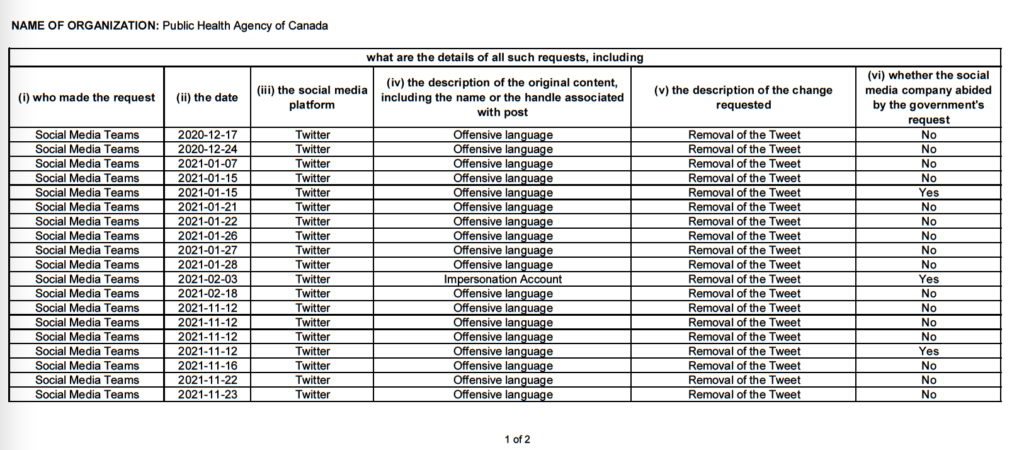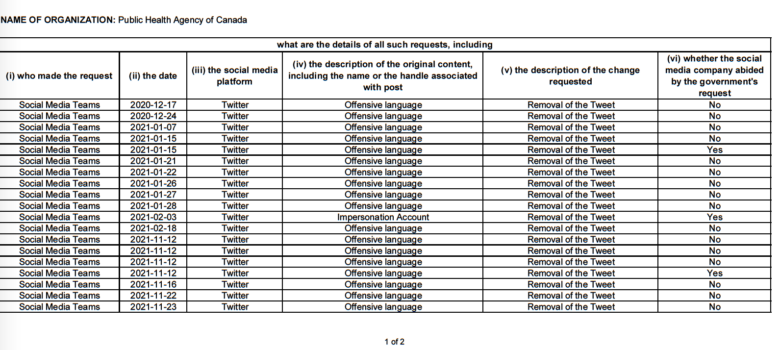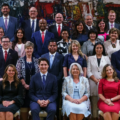The risks associated with the government’s online harms (or online safety) plans is not limited to Canadian Heritage’s credibility gap, which as I’ve recounted has included omitting key information in its public reports on consultations and shocking efforts to exclude contrary voices altogether. A new report, based on the government’s response to a Parliamentary Written Question from Conservative MP Dean Allison (Sessional Paper No. 8555-441-1219) raises new concerns about efforts to censor social media. The written question asked the government for “requests made by the government to social media companies to take down, edit, ban or change in any other way social media content, posts or accounts since January 1, 2020.”
The resulting report is stunning as government departments have in fact pressured the social media companies to remove news links and a range of lawful content including tweets that are said to contain “offensive language” or an “offensive reply.” The use of government power to censor social media posts or news links is exceptionally dangerous and crystallizes the fears of regulatory powers without the necessary due process and oversight that could lead to censorship of lawful content online.
The headline grabbing example comes from the Immigration and Refugee Board of Canada, which pressured both Facebook and Twitter to remove links to a Toronto Sun article.

Sessional Paper No. 8555-441-1219, page 89
Sun columnist Lorne Gunter provides background on the case since the request involved his column. Whether the column is accurate or not is irrelevant. The government can take issue with the column directly with the paper, but trying to limit its visibility by censoring links is precisely the fear associated with Bill C-11, which does not regulate what Canadians say, but could limit their ability to be heard.
In addition to targeting news links, various departments have pressured Twitter to remove tweets that do not appear to be unlawful. For example, the Public Health Agency of Canada pressured Twitter to remove many tweets it said contained “offensive language.”

Sessional Paper No. 8555-441-1219, page 76
Twitter typically declined to do so, but seeking to censor tweets based on offensive language is entirely inappropriate for any government which claims to be committed to freedom of expression. Industry Canada similarly sought to censor an “offensive reply” to a tweet on the Competition Bureau’s Fraud Prevention Month. Twitter again said no. A Twitter search points to this as the originating tweet. The remaining reply is a bit strange but certainly not reasonably described as offensive.

Sessional Paper No. 8555-441-1219, page 95
The demands to censor tweets was not limited to text. Environment and Climate Change Canada pressured Twitter to remove a tweet that it said contained a “violent photo.” Once again, Twitter refused to do so.

Sessional Paper No. 8555-441-1219, page 42
This data gives rise to several takeaways. First, while the government has embraced every opportunity to criticize big tech companies, when it came to content takedowns of lawful content, those companies at least seemed to understand the importance of freedom of expression and did not cave to government pressure. And make no mistake, the pressure to respond favourably to a government demand to remove content is significant. Indeed, consider the Canadian Heritage committee’s current fishing expedition hearings that demand executive appearances, internal documents, and some third party correspondence as retribution for opposing the government’s Bill C-18. A similar scenario could easily unfold as MPs perform for the cameras in demanding answers for why content identified by government departments wasn’t removed.
Second, the government’s pre-occupation with mean tweets must be contrasted with the claims last year involving Canadian Heritage funding Laith Marouf, an anti-semite as part of its anti-hate program. The timelines provided by officials, including government ministers, suggested that no one noticed multiple tweets on the issue that were posted months before the issue became more widely known. Those claims were always implausible and now seem impossible given how closely departments seem to monitor commentary on social media that is directed their way.
Third, it is difficult to separate the government’s willingness to censor social media posts with its broader Internet regulation agenda, including Bills C-11, C-18 and online harms. Seeking to remove news links, mean tweets and other content without due process and without any apparent illegality does not bode well for the development of Charter-compliant regulations. The government may see itself as a model for others, but its willingness to muscle social media companies in an effort to remove lawful content is the very worst kind of example that should not be welcome in a democracy that prioritizes freedom of expression.









Wow. Simply, wow!
Welcome to China folks. I wonder when the Great Firewall of Canada will be erected. This is not hyperbole. It will happen. With all of this (attempted) Internet censorship that is happening and all the more that is going to happen, and the natural global resistance there will be to it, Canada is going to have no choice but to start ordering ISPs to start blocking content.
Canadians will start turning to VPNs to escape the ordered ISP blocking and such VPNs will become subject to being blocked by ISPs. Soon there will be more VPNs (both commercial, very well known VPN “providers” as well as individuals that create their own “unknown” VPNs on servers around the world) than the government can keep track of and then “encryption” will become illegal. See this page for a global overview of encryption illegality or restriction:
https://www.gp-digital.org/world-map-of-encryption/
There are “5 eyes” countries (as well as many other “democracies”) listed there that put controls and restrictions on encryption. Don’t think that this Liberal government that is in office now, trying to grab control of the Internet is above it.
This is indeed worrying.
I’m a little surprised that no Canadian journalist (esp. someone like Rupa) has approached Elon Musk for a “Canadian Twitter Files”. This list of disclosed takedown requests is probably only the tip of the iceberg.
Probably because the original “Twitter Files” was a giant nothingburger meant to distract from Musk’s pure incompetence in running Twitter.
If anything, Twitter needs to continue publishing transparency reports like they did before Musk took over, but it appears that Musk put a stop to that. If they did, we’d have more up to date data on who demanded what in taking down content and for what reason like we are seeing above.
How could a Geist reader possibly think the Twitter Files were a nothingburger? They exposed exactly what Geist is reporting on here, except much larger.
They’re not shaking the foundations of civilization (because they mostly just confirm what people suspected was going on anyway), but they’re definitely not a nothingburger.
Pingback: Canada's government directly leaned on social media platforms to censor news and tweets
I wonder when the government will remind publishers that Bill C18 hasn’t passed and that social media companies are bad at removing offensive and inaccurate material.
Pingback: Canada’s government directly leaned on social media platforms to censor news and tweets - Data Fidelity
So to be clear, you are arguing in favor of offensive language, offensive comments, impersonation accounts, and violent photos.
I’ve followed you for over a decade, and actually went to parliament hill protests, and met with my MP over a bill you flagged way back when.
I think I’m done now. I don’t understand what’s happened to you, but I’m out.
This really feels like a troll to me. How do you follow Prof. Geist for over a year and not have any understanding of such basic rights as freedom of expression?
Who gets to decide, for everyone else, what offensive language and offensive comments are?
If you’d have read this article and it’s links, you would even see a case where the government deemed printing of a news story with information that it found embarrassing as being “offensive” and issued a take-down of references to the new story.
Is that really what you want? Do you want the government being the gatekeepers of the definition offensive and using it to suppress news of it’s nefarious activities?
Sounds like you need to live in China or one of those oppressive middle-east countries if you agree with this.
This has to be a troll.
People are free to say offensive things; you are free not to listen. Especially on social media platforms, it’s easy to mute certain keywords and block certain people.
Social media companies shouldn’t censor *anything*, short of illegal material such as revenge porn and images of child sexual abuse. Social media should be a neutral medium for speech, just like the telephone lines or the air you speak into.
Don’t let the door hit you on the way out. Shouldn’t figured out that Geist is a non-partisan and not an LPC mouthpiece. He has yet to change that.
I believe the argument is that the government shouldn’t be hunting down specific tweets to remove. There are already mechanisms in place to report these posts, and while we can put pressure on Twitter to strengthen these mechanisms–that’s quite different from the government attempting to get into the business of specifically removing posts or monitoring content.
Internet freedom was a bipartisan ideal in Canada back when we balked at the idea of the US Patriot Act. That should continue, no matter who holds the reins of power. It’s up to journalists, academics, and individual citizens to keep the government accountable when it attempts to claim undue authority.
Given the Online Safety legislation is going through the Heritage department now, this is absolutely the time to discuss the government’s aims in controlling or manipulating speech online.
Pingback: Canadian Government Censorship Expands to More Than Just a Single News Article
> Given the Online Safety legislation is going through the Heritage department now, this is absolutely the time to discuss the government’s aims in controlling or manipulating speech online.
For all the good it will do. This government has amply displayed complete disregard for what anyone, other than the lobbyists lining their pockets has to say.
Consultation with this government is complete theatre.
Pingback: Links 14/04/2023: More Twitter Losses and H-1B Exploitation | Techrights
Don’t let the door hit you on the way out. Shouldn’t figured out that Geist is a non-partisan and not an LPC mouthpiece. He has yet to change that.
bodrum güzel kızlar yerli ve yabancı modeller yeni sitemiz herkesi bekliyoruz.
eskişehir kaliteli bayan hizmetleri için sitemize bekliyoruz beyler.
escort bayan eskişehir
güzel kaliteli kızlar ve partnerlik hizmetleri için sitemize bekliyoruz
They are already banning bit chute videos in Canada: I got this notice when trying to view a video:
‘The parent channel of this video is unavailable at your location due to the following restrictions:
Requested by Authorities’
Could you provide any more details on this? Like a URL or something where others can confirm your claim?
Pingback: Stinky fish • Telecom Trends
dubai escort, escort girls dubai – dubai escort agency
trabajo como esocrt
dubai escort, escort girls dubai – dubai escort agency
Pingback: Drastic Things Are Happening in Canada - Tinh
Pingback: Drugs and Propaganda: Drastic Things Are Happening in Canada | peckford42
The Illegeal act of Justin Trudeau and liberals , NDP and who ever signe for BILLS C 11 AND BILL C 18 has put everyone in Danger . Please let me give you a idea of how it is affecting Canada and Canadains across our country . Most or use rely on the interenet for news etc . We do not have news papers in most communities with in the northern parts of Canada . Now you Emergincy on Wild Fires across Canada being in Emergincy state . People can not get the information they need or receve in time. People may Die cause of the lack of the information acts BILL C11 AND C18 apossed by the Justin Trudeaus and his Liberals . This is Putting All Canadaians in arms way all Emergincies , Some People do not have Cell phones to get this messages of any alerts , “ONLY INTERNET THAT HAS BEEN LIMITED OF ALL NEWS ETC ACROSS CANADA . I would like to say in my own option , IF SOMEONE IS TO DIE BECAUSE OF ALL OR ANY FOREST FIRES ANYWHERE ACROSS CANADA , THAT JUSTIN TRUDEAU AND WHO SIGNED FOR THIS BILLS C 11 OR C18 SHOULD BE CHARGED WITH CRIMES AGAINST HUMANITY . THIS BILLS ALSO VIOLATES THE DISABILITIES LAWS THROUGH OUT CANADA. PEOPLE WHO ARE DISABLED NEED MORE TIME TO EVACUATE AS WELL : BILLS C 11 AND BILL C18 IS ILLEGIAL WITH IN CANADA: I am a Disabled person IN CANADA ALONG WITH ALL CANADIANS ACROSS CANADA :TRUDEAU LIBERALS , JAGMEET SINGH NDP , AS WELL AS WHO EVER SIGNED THIS BILL HAS VIOLATED THE DISABILITIES ACT AS WELL . UN DISABILITIES ACT , CHARTER OF RIGHTS ACT , HUMANS RIGHTS ACT , ONTARIO DISABILITIES ACT AND DUTIES TO ACCOMMODATE , ETC . WHICH IS A FEDERAL OFFENCE AND PROVINCIAL OFFENCES . UNDER THE UN DISABILITIES ACT , CHARTER OF RIGHTS FOR DISABILITIES , HUMANS RIGHT ACT , ONTARIO DISABILITIES ACT , AND THERE IS MORE AS WELL .BILLS C 11 AND BILL C18 IS ILLEGIAL WITH IN CANADA: I am a Disabled person IN CANADA ALONG WITH ALL CANADIANS ACROSS CANADA :TRUDEAU LIBERALS , JAGMEET SINGH NDP , AS WELL AS WHO EVER SIGNED THIS BILL HAS VIOLATED THE DISABILITIES ACT AS WELL . UN DISABILITIES ACT , CHARTER OF RIGHTS ACT , HUMANS RIGHTS ACT , ONTARIO DISABILITIES ACT AND DUTIES TO ACCOMMODATE , ETC . WHICH IS A FEDERAL OFFENCE AND PROVINCIAL OFFENCES . UNDER THE UN DISABILITIES ACT , CHARTER OF RIGHTS FOR DISABILITIES , HUMANS RIGHT ACT , ONTARIO DISABILITIES ACT , AND THERE IS MORE AS WELL . BILLS C 11 AND BILL C18 IS ILLEGIAL WITH IN CANADA: I am a Disabled person IN CANADA ALONG WITH ALL CANADIANS ACROSS CANADA :TRUDEAU LIBERALS , JAGMEET SINGH NDP , AS WELL AS WHO EVER SIGNED THIS BILL HAS VIOLATED THE DISABILITIES ACT AS WELL . UN DISABILITIES ACT , CHARTER OF RIGHTS ACT , HUMANS RIGHTS ACT , ONTARIO DISABILITIES ACT AND DUTIES TO ACCOMMODATE , ETC . WHICH IS A FEDERAL OFFENCE AND PROVINCIAL OFFENCES . UNDER THE UN DISABILITIES ACT , CHARTER OF RIGHTS FOR DISABILITIES , HUMANS RIGHT ACT , ONTARIO DISABILITIES ACT , AND THERE IS MORE AS WELL . CRIMES AGAINST HUMANITY BY JUSTIN TRUDEAU AND DOUG FORD SHOULD BE IMPOSSED ON THEM FOR BILL C11 AND BILL C18 AND THE LIMATATIONS OF NEWS ON FACEBOOK OR GETTING ALL OR ANY INFORMATION , LIKE ON RAGING FOREST FIRES. I AM A DISABILED PERSON AS WELL AND I RECIVED THIS INFORMATION FROM 3RD OR 4TH HAND INFOMATION , IF IT REACHES US WE ARE DEAD OR SEVRORY INJERED AND SORRY WILL NOT COVER IT THIS TIME .
The issue of censorship on social media platforms is complex and often raises concerns about freedom of expression, transparency, and the concentration of power. It can also spark debates regarding the responsibility of social media companies in determining what content should be allowed or removed.
The problem is as this : You are telling people what they are going to do and not letting them make there own destions on what Canadains want. So many Laws and rights have been Broken here with your CENSOURSHIP OF THE INTERNET. You all neglect that people have human rights here under mega laws and they where put in to place for mega reasons . Bills C11 and C18 is going to kill people through out Canada. Reason for this Some People do not have cell phones LIKE ME AND MY HandieCaped wife SPEACIALY IN THE Northern Ontario and Canada. 2/ People rely on the News toget the information that they need , Like Forest Fires etc . If we do not get this information then it will be way to late and People will Die and that is BOTTOME LINE . We only use the internet for news Daily and now you all censered it. Well we are on this subject People on Disabilities across Canada has More RIGHTS THEN You Do Or Justin Trudeau who we do not trust from One Day To ANOTHER’ In My Opion , The UN Disabilities Act , Charter OF Rights and FREEDOMS Act for People with Disabilities , Ontario Disabilities act and duties to accomadate , and also The Humans Rights act of being Barrier Free . Justin Trudeau and who ever signed this bills has severory Violated our rights as Disabiled People through out Canada . Regardless the Damage is Done and VIOLATIONS and Criminal LAWS HAS BEEN SERIOUSLY BEEN COMMITED agaist people with Disabilities Witch is JAIL Time crimeal Acts Of Affences . Sorry DOES NOT CUT IT . THis goes all the way up to the senet and back to Justin Trudeau and his hole Cabnet Plus . all because Disabilities rights has been violated . It is our life and our human rights of what we want to do with in our life not what someone else is going to dictate to us Canadaians . Talk about Pregulisum etc at its Best. I am a disabiled Person along with mega others through out Canada and other issues besides this as well , Though this is a good start for now . Internet is Free and should not be regulated what so Ever against the Freedom of Exsprestion and Freedom OF Speech , WITch is causeing Barriers .
istanbul escort ajans, escort ajansları istanbul, istanbul güvenilir escort ajansı
escort başvuru, escort olmak, escortluk yapmak